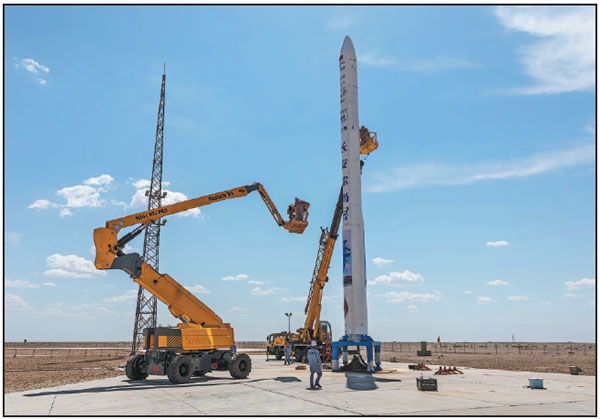Private company makes space debut
Rocket puts satellites, payloads into orbit 300 km above ground
A private Chinese company used its own carrier rocket to send two satellites and several experimental payloads into space on Thursday, marking the first orbital mission carried out by the country's private-sector space industry.
The SQX-1 Y1 solid-fuel carrier rocket, the first in the SQX-1 series, blasted off at 1 pm, from a launchpad at Jiuquan Satellite Launch Center in Northwest China's Gobi Desert.
Nearly 15 minutes after ignition, the 25-meter-tall rocket successfully placed the two satellites - one from State-owned defense conglomerate China Aerospace Science and Industry Corp and the other from the Beijing Institute of Technology - into a low-Earth orbit about 300 kilometers above the ground.
The mission's success is considered by experts to be a new milestone in China's space industry as it showed that after previous failed attempts, a Chinese private enterprise has finally succeeded in conducting an orbital launch - a threshold for any serious newcomer in the global space sphere that had only been crossed by the United States' SpaceX before Thursday.
Developed and produced by i-Space, a Beijing-based space startup founded by a group of Chinese rocket researchers who previously worked for State-owned enterprises, the three-stage SQX-1 is mainly propelled by solid fuel, has a liftoff weight of 42 metric tons and a diameter of 1.4 meters.
Its launch capacity allows it to transport satellites with a total weight of 500 kilograms into a sun-synchronous orbit 500 kilometers above the Earth, according to the company.
Designers at i-Space call SQX-1 the most powerful carrier rocket ever built by a private company in China.
Private companies are eager to seize business opportunities in the nation's burgeoning commercial space launch market.
Leading private rocket makers in China - i-Space, LandSpace and OneSpace - have been striving to develop their own carrier rockets. Currently, they are mainly made by State-owned space giants.
Carrier rockets are in short supply because of surging demand for launch services from the country's flourishing satellite sector.
Executives at these firms are aware that becoming the first private company to launch a carrier rocket into orbit would bring not only honor but also lucrative contracts.
Two previous attempts at orbital launches by LandSpace and One-Space were unsuccessful.
Yao Bowen, spokesman for i-Space, said Thursday's launch indicated that his company is ready to conduct commercial launches.
Yao said i-Space will carry out five SQX-1 launches for clients before the end of 2020, adding that the company's second type of carrier rocket - the SQX-2 reusable liquid-propelled rocket - is under development and is scheduled to make its maiden flight in 2021.
Xing Qiang, founder of Micro-Rocket Union, a nonprofit space research organization in Beijing, said the SQX-1 mission will become a symbol of the Chinese private space sector's technological capability and determination, and will also boost investor confidence in this business.
"In the near future, privately built carrier rockets will play a major role in the construction of low-orbit satellite systems and space-based internet-of-things networks," Xing said. "In addition, the rapid growth of the space-based technology demonstration business will require a great deal of launch services by these rockets."
Lan Tianyi, founder of Ultimate Blue Nebula, a private aerospace consultancy, said the success will boost the confidence of other private rocket makers and bring more public attention to the industry.
By the end of 2018, there were 123 private enterprises on the Chinese mainland registered in the space industry, and 14 of them were focused on rocket development and production, according to a recent report by FutureAerospace, a space industry consultancy in Beijing.
zhaolei@chinadaily.com.cn
|
The SQX-1 Y1 solid-fuel carrier rocket is getting ready for the launch at Jiuquan Satellite Launch Center in Northwest China's Gobi Desert on Wednesday. Chen Xiao / For China Daily |
(China Daily Global 07/26/2019 page3)



















